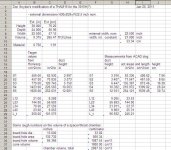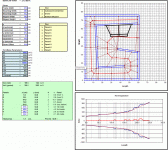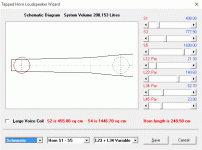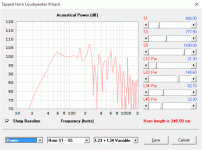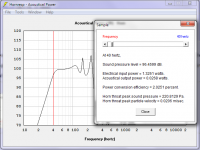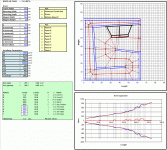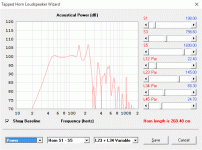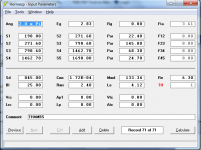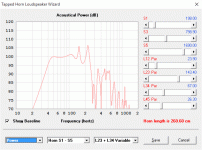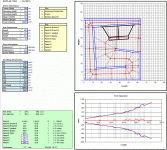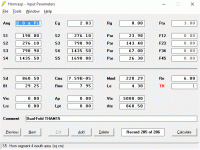Looking to increase my understanding of HR. I am pretty comfortable substituting drivers in existing sims but it's time to get outside of my comfort zone. I have become enamored with a particular sim and driver combo. Don Snyder's take on the THAM15 with the PA385-8. Info here: http://www.diyaudio.com/forums/subwoofers/175658-tham15-compact-15-tapped-horn-2.html#post2440483
I have contacted Don and he no longer has info relating to this design. I'd like to reverse engineer the sim and take a good look at the design. Although originally designed for the 3015LF, the PA385-8 just looks great in it. The PA385 was not around back then. This could be a classic DIY audio TH cabinet.
To start... Don's HR comment lists dimensions 22.5x24x30. Schematic screen shows system volume of 210.88L/7.7ft3. The above box is 9.38ft3. If I subtract 1.5" from the measurements above, I get 7.4ft3. Interior or exterior measurements? Or maybe there is a better way to start?
HR export attach to those willing to play along. THANKS IN ADVANCE!
I have contacted Don and he no longer has info relating to this design. I'd like to reverse engineer the sim and take a good look at the design. Although originally designed for the 3015LF, the PA385-8 just looks great in it. The PA385 was not around back then. This could be a classic DIY audio TH cabinet.
To start... Don's HR comment lists dimensions 22.5x24x30. Schematic screen shows system volume of 210.88L/7.7ft3. The above box is 9.38ft3. If I subtract 1.5" from the measurements above, I get 7.4ft3. Interior or exterior measurements? Or maybe there is a better way to start?
HR export attach to those willing to play along. THANKS IN ADVANCE!
Attachments
Hi Zwiller,
Ref. (great thread 🙂 ): http://www.diyaudio.com/forums/subwoofers/175658-tham15-compact-15-tapped-horn.html
I noticed your link in Brian's "Spreadsheet for Folded Horn Layouts..." thread. This looks like some suggestion Don threw out four years ago in the THAM15 thread, and there was no interest/follow-up. The THAM15 is a great thread, but the posted drawing and the Hornresp simulation you found do not quite conform. As I had taken a look at that one before, let me roughly outline some steps that might help in your quest here, and in general:
- do a quick overlay drawing to get the drawing into your favorite drawing package, and scale the drawing to the desired height and depth,
- add the necessary construction lines and the advanced center line as recommended by soho54 (see all the notes by soho54 in THAM15 thread you linked to, e.g.: Post #202-209)
- draw a horn path (development / roll-out) that shows S1 to S5 - L12 to L45 (width and length) as actually in the drawing (see the nice example by xoc1 in the THAM15 thread Post #204)
- get the Hornresp data into a spreadsheet to calculate the horn area width data from the Hornresp data (you can also get all the data from Hornresp - Schematic - File - Export - Horn Data in tabular form)
- transfer the width/length data from the spreadsheet into a development (roll-out) of the horn path in your drawing
You can now compare the development you extracted from the drawing to the development you derived from the Hornresp data in graphical form. And in this case there seems to be quite a difference (it happens 🙂 ).
Also, I had a development for the original THAM15 (from my drawing, no guarantees) that I also inserted into the drawing. So now we can compare all three developments.
Hope this helps.
Regards,
Ref. (great thread 🙂 ): http://www.diyaudio.com/forums/subwoofers/175658-tham15-compact-15-tapped-horn.html
I noticed your link in Brian's "Spreadsheet for Folded Horn Layouts..." thread. This looks like some suggestion Don threw out four years ago in the THAM15 thread, and there was no interest/follow-up. The THAM15 is a great thread, but the posted drawing and the Hornresp simulation you found do not quite conform. As I had taken a look at that one before, let me roughly outline some steps that might help in your quest here, and in general:
- do a quick overlay drawing to get the drawing into your favorite drawing package, and scale the drawing to the desired height and depth,
- add the necessary construction lines and the advanced center line as recommended by soho54 (see all the notes by soho54 in THAM15 thread you linked to, e.g.: Post #202-209)
- draw a horn path (development / roll-out) that shows S1 to S5 - L12 to L45 (width and length) as actually in the drawing (see the nice example by xoc1 in the THAM15 thread Post #204)
- get the Hornresp data into a spreadsheet to calculate the horn area width data from the Hornresp data (you can also get all the data from Hornresp - Schematic - File - Export - Horn Data in tabular form)
- transfer the width/length data from the spreadsheet into a development (roll-out) of the horn path in your drawing
You can now compare the development you extracted from the drawing to the development you derived from the Hornresp data in graphical form. And in this case there seems to be quite a difference (it happens 🙂 ).
Also, I had a development for the original THAM15 (from my drawing, no guarantees) that I also inserted into the drawing. So now we can compare all three developments.
Hope this helps.
Regards,
Attachments
[Here's a first attempt at something very similar, but not exactly the same. The external dimensions match, and I've rejigged part of the horn to smooth the expansion rate.
Something is still not quite right though, as the spreadsheet predicts at net volume of 199L and the HornResp sim suggests 208 L (it should always be lower than what the spreadsheet predicts).
I'll have another look at it this week if I get the opportunity.
Something is still not quite right though, as the spreadsheet predicts at net volume of 199L and the HornResp sim suggests 208 L (it should always be lower than what the spreadsheet predicts).
I'll have another look at it this week if I get the opportunity.
Attachments
Many thanks Gents! Seems like you both have come to a similar conclusion that something is amiss. I will continue to study the info presented but it appears the path length is a bit short.
Let me clarify why I am enamored with this design: This design seems to be a very balanced trade off of output for extension. In addition, it is a compact box and cost effective driver. Oh yeah, pretty easy build too... Dons design seems to bridge the gap between the THAM15/SS15 and XOC1/KS designs.
Let me clarify why I am enamored with this design: This design seems to be a very balanced trade off of output for extension. In addition, it is a compact box and cost effective driver. Oh yeah, pretty easy build too... Dons design seems to bridge the gap between the THAM15/SS15 and XOC1/KS designs.
Attachments
Hi Zwiller,
Forsman added a nice wrinkle to the THAM design (I guess we could call it the Forsman loop) that would give you your extra length.
http://www.diyaudio.com/forums/subwoofers/224160-thorn-f1-learning-experiance-tapped-horn.html
Regards,
Forsman added a nice wrinkle to the THAM design (I guess we could call it the Forsman loop) that would give you your extra length.
http://www.diyaudio.com/forums/subwoofers/224160-thorn-f1-learning-experiance-tapped-horn.html
Regards,
Something is still not quite right though, as the spreadsheet predicts at net volume of 199L and the HornResp sim suggests 208 L (it should always be lower than what the spreadsheet predicts).
I'll have another look at it this week if I get the opportunity.
I found out where the error was - it turned out to be pretty simple.
Here's the power of the spreadsheet in use - this is a dual-fold THAM15 rejigged to be a decent match for Dayton Audio's PA380 driver. A slight change in the external dimensions and a shift in the internal layout is all that's needed.
Attachments
Thanks Oliver. Got excited the Forsman used a 12 but the sim with Infinity 1260w disappointed. I will try and sub a few other 12's. That design is busy and full of reflectors, these have been proven unnecessary right?
Brian, my sim does not look like yours. Decent but not as flat and low. I checked my HR inputs a few times.
In any event, you guys are getting me really close to what I am after. 😎
Brian, my sim does not look like yours. Decent but not as flat and low. I checked my HR inputs a few times.
In any event, you guys are getting me really close to what I am after. 😎
Attachments
Brian, my sim does not look like yours. Decent but not as flat and low. I checked my HR inputs a few times.
Yeah, that's probably because my driver information is different 🙂. I think I used the PA380 for that sim.
I'll check this afternoon to see if it can be modified to be suitable for the PA385.
Yeah, that's probably because my driver information is different 🙂. I think I used the PA380 for that sim.
Oh, and you're not accounting for the volume in front of the cone in your sim.
Here's one, using the PA385S driver. I've updated the spreadsheet as well (added some new features, and addressed one minor bug). I'll post the spreadsheet to my "spreadsheets" thread.
Note: the passband of this TH can be flattened even more by reducing S1, but the CR starts being pretty high.
I've also corrected the estimate for the driver's size in the TH 🙂
Note: the passband of this TH can be flattened even more by reducing S1, but the CR starts being pretty high.
I've also corrected the estimate for the driver's size in the TH 🙂
Attachments
How would 4 of these loaded with the PA-385 at max power compare with the SS15 loaded with the 3015LF? I would consider building and testing one of these the next time PE has their Dayton drivers on sale if the extra performance would be worth the extra 40lb weight over a SS15 with a 3015LF.
Last edited:
How would 4 of these loaded with the PA-385 at max power compare with the SS15 loaded with the 3015LF? I would consider building and testing one of these the next time PE has their Dayton drivers on sale if the extra performance would be worth the extra 40lb weight over a SS15 with a 3015LF.
Based on the results of one sim I've seen, the SS15 will theoretically be about 2dB~2.5 dB more sensitive from 60 Hz up. At 50 Hz they will be about the same, and at 40 Hz this version of the THAM would have over 10dB more output.
I also expect that at higher SPL levels the THAM might actually perform better, due to the driver being used.
OTOH, the SS15 is a "proven" design. This one is not 🙂. There may be some "gotcha" awaiting the one who tries to build it first. It will definitely need to be properly braced, btw.
If I was single and had a spare PA385 on hand, I'd be tempted to try it.
Thanks Brian, I may have a go at building one of these using the last spreadsheet layout you provided when the drivers are on sale. I have an RTA mic and an open field where I could test. Sorry for the thread hijack. 🙂
Thanks Brian, I may have a go at building one of these using the last spreadsheet layout you provided when the drivers are on sale. I have an RTA mic and an open field where I could test. Sorry for the thread hijack. 🙂
Good stuff. I am thinking of redoing that spreadsheet a bit though. At the moment the layout of the external panels is a bit different to the "normal" layout, in that the top and the bottom panels are actually wider than the internal panels. I'm thinking of changing it so that their width matches the internal panels - which should make cutting the panels a lot easier as most of them would be the same width.
No worries, I am in no hurry. The extra 10db at 40 looks appealing. However, the weight of the ss15 looks REALLY REALLY appealing so I am still deciding what I need more, mobility or extension. I would be willing to give one a go, test it and beat the crap out of it for a while.
No worries, I am in no hurry. The extra 10db at 40 looks appealing. However, the weight of the ss15 looks REALLY REALLY appealing so I am still deciding what I need more, mobility or extension. I would be willing to give one a go, test it and beat the crap out of it for a while.
The light weight of the SS15 is partly due to the choice of driver - the neo-magnet 3015LF. If you can identify a neo-magnet driver that has specs that are reasonably close to the PA385, it should be possible to rejig the layout of the THAM (now that we have a spreadsheet to do so) to get the best results from that driver.
The light weight of the SS15 is partly due to the choice of driver - the neo-magnet 3015LF. If you can identify a neo-magnet driver that has specs that are reasonably close to the PA385, it should be possible to rejig the layout of the THAM (now that we have a spreadsheet to do so) to get the best results from that driver.
Understood. A neo driver that specs similar around $250 would be nice but I am not sure if that is a fantasy or not. I will research.
It all comes down to if I need to re-invent the wheel here. I am going to be building 4 boxes for use in a live rock and country act that some times uses an accompaniment track for synth. I need to look at my tracks on a spectrum analyzer and see if if is worth messing with a new design vs the SS15.
Thanks again for all of the help with the spreadsheet!
Brian, thanks again. Tried simming the newest version and still can't get mine in line with yours, even though you gave me the cone volume. Gotta be atc and trying to figure that out. Do I use Sd/baffle diameter for atc? (I get really close using that)
Yep, that add'l 10db @ 40Hz is where it's at for me. -10db is low 30's to boot.
Personally, since I don't regularly gig, the weight does not deter me but cost does 😀. Surely, there are some neo drivers as I think the PA385 is basically a poor man's B&C 15NBX100 but even that is 20lbs. The 3015LF is _LIGHT_ at 10lbs.
Yep, that add'l 10db @ 40Hz is where it's at for me. -10db is low 30's to boot.
Personally, since I don't regularly gig, the weight does not deter me but cost does 😀. Surely, there are some neo drivers as I think the PA385 is basically a poor man's B&C 15NBX100 but even that is 20lbs. The 3015LF is _LIGHT_ at 10lbs.
Brian, thanks again. Tried simming the newest version and still can't get mine in line with yours, even though you gave me the cone volume. Gotta be atc and trying to figure that out. Do I use Sd/baffle diameter for atc? (I get really close using that)
Here's my HornResp input screen - check to see where it differs from yours.
Attachments
Really close now. Some of the driver parameters differ, I will double check tom.
Since this is my thread, can I ask a (another) dumb question? Can anything be done to change the slope of low knee/F3? IE anyway to manipulate this design to get above 90db at 30Hz? No need to model or change anything, mostly just curious. From the HR wizard lengthening L34 helps. Not sure if that basically screws the entire design up or not.
Bedtime for zwiller
Since this is my thread, can I ask a (another) dumb question? Can anything be done to change the slope of low knee/F3? IE anyway to manipulate this design to get above 90db at 30Hz? No need to model or change anything, mostly just curious. From the HR wizard lengthening L34 helps. Not sure if that basically screws the entire design up or not.
Bedtime for zwiller

- Status
- Not open for further replies.
- Home
- Loudspeakers
- Subwoofers
- Help reverse engineering sim THAM15DS
